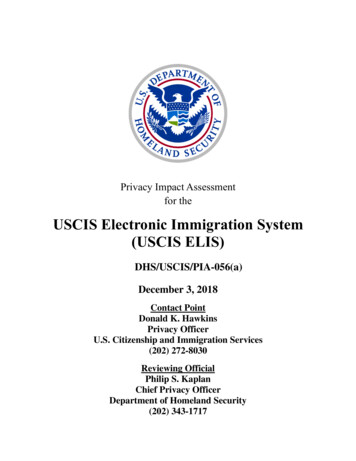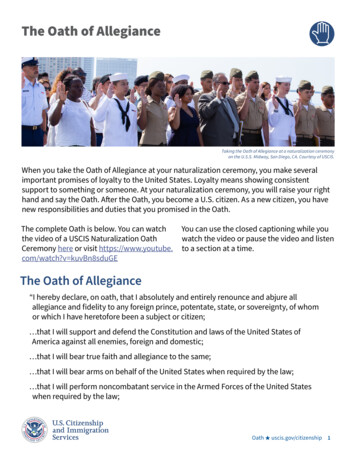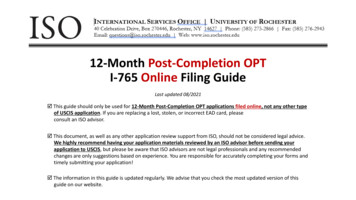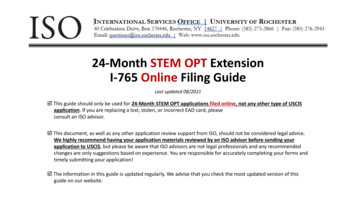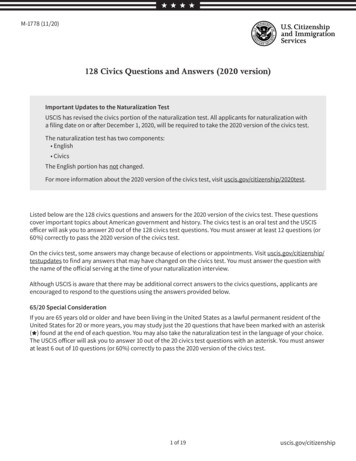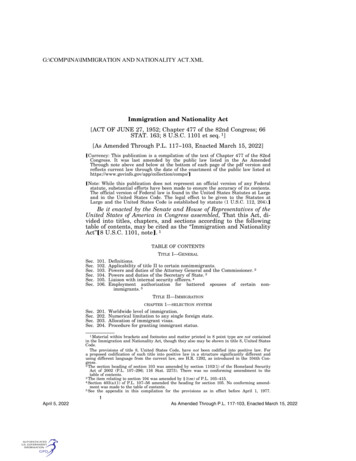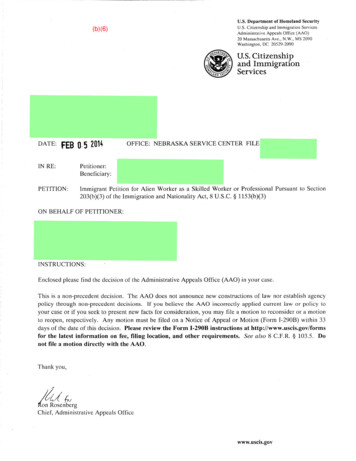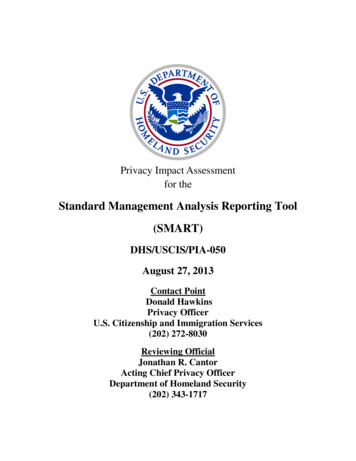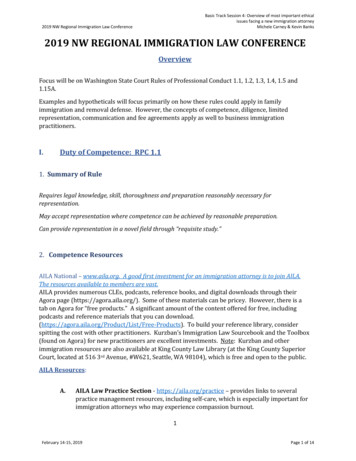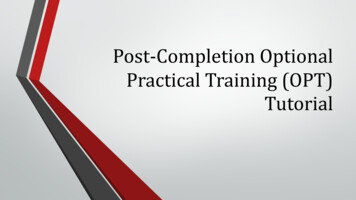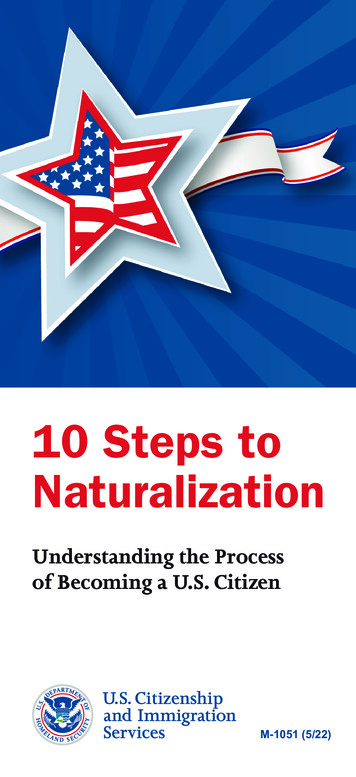
Transcription
10 Steps toNaturalizationUnderstanding the Processof Becoming a U.S. CitizenM-1051 (5/22)
Determine if you are already aU.S. citizen.You can become a U.S. citizen by birth or throughnaturalization. Generally, people are born U.S. citizensif they are born in the United States or if they areborn abroad to U.S. citizens. You may also deriveU.S. citizenship if you were under 18 and a lawfulpermanent resident when one or both of your parentsnaturalized, or after adoption by a U.S. citizen parent.; Were you born in the United States or a territory ofthe United States?If yes, you may already be a U.S. citizen.; Was at least one of your parents a U.S. citizenbefore you turned 18?If yes, you may already be a citizen.WHAT TO DO:Refer to Form N-600, Application for Certificateof Citizenship, or Form N-600K, Application forCitizenship and Issuance of Certificate, for moreinformation. If you have a U.S. citizen parent whois a U.S. citizen by either birth or naturalization youmay already be a citizen or may be able to apply for aCertificate of Citizenship based on their citizenship.If you do not believe you are a U.S. citizen by birth ordid not acquire or derive U.S. citizenship from yourparent or parents automatically after birth, go to thenext step.If you are not a U.S. citizen—Go to STEP 2
Determine your eligibility tobecome a U.S. citizen.In general, you may qualify for naturalization ifyou are at least 18 years old and have been apermanent resident for at least 5 years (or 3 yearsif you are married to a U.S. citizen) and meet allother eligibility requirements. You may also qualifyfor naturalization based on military service, whichhas different requirements.WHAT TO DO:; Read Form N-400, Instructions for Applicationfor Naturalization available at uscis.gov/n-400to learn more about naturalization andeligibility requirements.; Visit the Citizenship Resource Center at uscis.gov/citizenship for the Naturalization EligibilityTool to see if you are eligible to apply fornaturalization, and to find information on thecitizenship process, the naturalization test,and available study materials.For more information on naturalization throughmilitary service, visit uscis.gov/military.Eligible—Go to STEP 3Not Eligible—We encourage youto apply when you are eligible.
Prepare Form N-400,Application for Naturalization.When you meet all requirements to become aU.S. citizen, complete Form N-400 to apply fornaturalization. You can create an account and fileyour N-400 online, which allows you to receivecase status alerts, send secure messages, seeall case correspondence, check your case status,update personal information, and upload evidence.Visit uscis.gov/n-400 for more information andinstructions.WHAT TO DO:; Complete and sign your Form N-400.; Get 2 passport-style photos taken if you resideoutside the United States.; Collect the necessary documents todemonstrate your eligibility for naturalization.; Review your Form N-400 and supportingdocuments.Note: USCIS may ask for additional informationif your application is incomplete. This willdelay the processing of your application.Go to STEP 4
Submit Form N-400, Applicationfor Naturalization.Submit your application, documents, and fees toUSCIS. If you reside outside the United States, submitpassport-style photographs with your application.Once you submit Form N-400 and get a receipt notice,you can check current processing times and the statusof your application by visiting uscis.gov.WHAT TO INCLUDE:; Form N-400 and biometric services fees, ifapplicable.; Form N-648, Medical Certification for DisabilityExceptions, if applicable. If you are seeking anexception to the English and/or civics requirementfor naturalization because of a physical ordevelopmental disability or a mental impairment,submit Form N-648 with your package along withthe required evidence listed in the Form N-400instructions.; Submit two passport-style photographs if youreside outside the United States.Refer to Form N-400 instructions for additionaldocumentary requirements. Keep a copy of yourcompleted Form N-400 and any supporting evidence foryour records. You will be required to answer questionsabout your Form N-400 at your naturalization interview.Go to STEP 5
Go to the biometricsappointment, if thisrequirement applies to you.USCIS requires applicants to be fingerprintedand photographed for the purpose of conductingFederal Bureau of Investigation (FBI) criminalbackground checks. In some cases, USCIS maybe able to re-use fingerprints and photographsthat were previously taken to conduct the requiredbackground checks. You will either receive anotice that your biometrics have been re-used, or,if new biometrics are required, you will receive anotice of a biometrics appointment. All applicantsmust have background checks completed beforeUSCIS will schedule an interview.WHAT TO DO:; Receive an appointment notice that will includeyour biometrics appointment date, time, andlocation, if this applies to you.; Arrive at the designated location at thescheduled time.; Submit biometrics.; At a later date, you will receive an appointmentnotice for your naturalization interview.Go to STEP 6
Complete the interview.Once all the preliminary processes on your caseare complete, USCIS will schedule an interviewwith you. You must report to the USCIS office atthe date and time on your appointment notice.Please bring the appointment notice with you.It is very important not to miss your interview.If you must miss your interview, follow theinstructions on the appointment notice as soonas possible about how to contact the officeto reschedule your interview. Reschedulingan interview may add several months to thenaturalization process, so make all attemptsto attend your original interview date.Note: You must notify USCIS if you change youraddress after filing your Form N-400 within10 days of your relocation. For informationon filing a change of address, go to theUSCIS website at uscis.gov/addresschange.You must notify USCIS EVERY TIME youchange your address.Continued on next panel
Step 6 continued from previous panelWHAT TO EXPECT:; At the interview, you will meet with a USCISofficer and answer questions about your FormN-400.; If you are requesting a medical exception to theEnglish and civics testing requirements, submitForm N-648, Medical Certification for DisabilityExceptions if you did not submit it at the time youfiled your Form N-400.; You will take the English and civics tests, unlessexempt. Refer to Form N-400, Instructions forApplication for Naturalization, or s formore information on exemptions. Visit uscis.gov/citizenship for test preparation study materials.; In some cases, the USCIS officer will not beable to make a decision on your Form N-400the day of your naturalization interview. In thosecases, the USCIS officer will continue your case.This may include a request for you to provideadditional evidence or require a second interview.; USCIS will provide you with a notice of interviewresults following your interview.Go to STEP 6A for more information on a continuedapplication.If your applicationis continued—Go to STEP 6AIf your application receivesa final decision—Go to STEP 7
Application ContinuedThe following are the most common reasons forcontinuation: The USCIS officer determines you need toprovide additional documents or evidence.USCIS may ask you to submit additionaldocuments by giving you Form N-14, Requestfor Additional Information, Documents orForms. You will need to provide the additionaldocumentation requested to continue thenaturalization process. You fail the English or civics test, or both.USCIS will schedule you to come back foranother interview within 60 to 90 days of yourfirst interview. USCIS will only retest you on thepart (English or civics) that you failed. USCISwill deny your Form N-400 if you fail the testsa second time.Go to STEP 7
Receive a decision from USCISon your Form N-400, Applicationfor Naturalization.You will be issued a written notice of decision. Granted—USCIS may approve your Form N-400 ifthe evidence on record establishes your eligibilityfor naturalization. Denied—USCIS will deny your Form N-400 if theevidence on record establishes you are not eligiblefor naturalization.If your application is granted—Go to STEP 8If your application is denied—Go to STEP 7A
Application DeniedYou will receive a notice from USCIS explaining thereason for your Form N-400 denial. If you believe thatUSCIS incorrectly denied your Form N-400, you mayrequest a hearing to appeal this decision.WHAT TO DO:The denial notice you receive will have instructionson how to appeal the USCIS decision by filingForm N-336, Request for a Hearing on a Decision inNaturalization Proceedings. Visit uscis.gov/n-336 formore information. You MUST file Form N-336 withthe appropriate fee within 30 days of the Form N-400decision date. If a request for hearing is not filedwithin the time allowed, the denial decision is final.
Receive a notice to take theOath of Allegiance.WHAT TO EXPECT:USCIS will mail you a notification with the date, time,and location of your scheduled oath ceremony. Insome limited circumstances, you may be able toparticipate in an oath ceremony on the same dayas your interview. If you cannot attend the oathceremony on the day USCIS scheduled you, follow theinstructions on the N-445, Notice of NaturalizationOath Ceremony, on how to notify your local USCISoffice and ask USCIS to reschedule you.Go to STEP 9
Take the Oath of Allegiance tothe United States.You are not a U.S. citizen until you take the Oathof Allegiance at a naturalization ceremony. Theoath is administered by USCIS at an administrativeceremony or by a judge in a judicial ceremony. A courthas exclusive authority to conduct the ceremonies incertain USCIS districts.You receive your Certificate of Naturalization aftertaking the Oath of Allegiance.WHAT TO DO:; Complete the questionnaire Form N-445, Notice ofNaturalization Oath Ceremony.; Report for your oath ceremony.; Check-in with USCIS.; A USCIS officer will review your responses toForm N-445.; Turn in your Permanent Resident Card.; Take the Oath of Allegiance to become a U.S.citizen.; Receive your Certificate of Naturalization andreview it before leaving the ceremony site.Notify USCIS of any corrections to your certificateat that time.Go to STEP 10
Understanding U.S. citizenship.Citizenship is the common thread that connectsall Americans. Below is a list of some of themost important rights and responsibilities that allcitizens—both Americans by birth and by choice—should exercise, honor, and respect. Some of theserights and responsibilities also apply to noncitizensin the United States as well. While some of theseresponsibilities are legally required of every citizen, allare important to ensure the continued vitality of ourcountry and democracy.Rights Freedom to express yourself. Freedom to worship as you wish. Right to a prompt, fair trial by jury. Right to vote in elections for public officials. Right to apply for federal employment requiringU.S. citizenship. Right to run for elected office.Continued on next panel
Step 10 continued from previous panelResponsibilities Support and defend the U.S. Constitution. Stay informed of the issues affecting yourcommunity. Participate in the democratic process. Respect and obey federal, state, and local laws. Respect the rights, beliefs, and opinions of others. Participate in your local community. Pay income and other taxes honestly, and on time,to federal, state, and local authorities. Serve on a jury when called upon. Serve the country as needed.
Helpful ResourcesThe decision to apply for U.S. citizenship is up toeach individual. USCIS has a variety of educationalresources to help you prepare. You will find informationon eligibility and testing, the application process,and study materials. You can also learn more aboutcitizenship rights and responsibilities and find a freeUSCIS information session in your area.U.S. Citizenship and Immigration Services (USCIS)is the government agency that oversees lawfulimmigration to the United States.uscis.govThe USCIS Citizenship Resource Center provideslearners and applicants with a one-stop resource forlocating citizenship preparation materials.uscis.gov/citizenshipUSCIS regularly holds free information sessions forthe public. Topics covered at these sessions includenaturalization eligibility requirements, the naturalizationprocess, and the naturalization test.uscis.gov/citizenshipsessionsForm N-400, Application for Naturalization is the formyou will use to apply for U.S. citizenship.uscis.gov/n-400If you believe you are already a U.S. citizen, determineif you are eligible to file Form N-600, Application forCertificate of Citizenship or Form N-600K, Application forCitizenship and Issuance of Certificate.uscis.gov/n-600uscis.gov/n-600kTo update your address with USCIS, file Form AR-11,Change of Address.uscis.gov/addresschangeFind legal assistance nship/find-help-inyour-community
; A USCIS officer will review your responses to Form N-445.; Turn in your Permanent Resident Card.; Take the Oath of Allegiance to become a U.S. citizen.; Receive your Certificate of Naturalization and review it before leaving the ceremony site. Notify USCIS of any corrections to your certificate at that time. Go to
